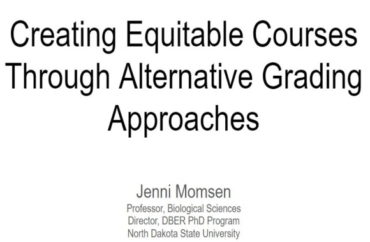
North Dakota State University scholars study ‘unintended consequences’ of grading
Two North Dakota State University biologists are exploring alternative grading practices in an effort to research and advance equitable grading concepts.
Part of the research for one of the scholars is funded through a grant handed out as part of the American Rescue Plan Act of 2021, passed as a COVID stimulus relief package.
North Dakota State University postdoctoral research fellow Tara Slominski has been awarded $300,000 by the National Science Foundation to aid her in her efforts to reimagine grading.
“Common classroom practices, such as grading and the use of grades to assess knowledge and performance, may have unintended consequences on students who invariably derive an awareness of their own academic abilities from the results of those grading structures,” the award abstract states.
“In fact, these traditional practices may inadvertently create and promote inequities among different student groups,” it adds.
As part of her federally funded project, slated to begin this January, Slominski will seek to “examine the impact of grading practices on self-concept and STEM persistence with a special focus on rural and nontraditional students” in the hope of producing “new insights about equitable classroom and grading practices,” the abstract states.
One stated goal of the research is to “develop empirically supported approaches of equitable grading strategies.”
What constitutes “equitable classroom and grading practices” is not spelled out in the award abstract. The College Fix reached out to Slominski for clarification via email, but did not receive a reply.

However, some clues regarding these matters can be found on the lab website of Slominski’s supervisor, Jennifer Momsen.
Since 2020, Momsen, a professor in the Department of Biological Sciences at NDSU, has produced multiple blog posts and presentations detailing her thoughts on and experiences with equitable practices and strategies.

In slides from a spring 2022 presentation, Momsen described grading as “Inaccurate, biased, demotivating” and an “Amalgamation of information that obscures any meaning.” What professors need to do is “Clearly define goals and criteria for success” and “Articulate a plan for how student learning will be assessed, and course grades determined.”
Two alternatives Momsen proposes for educators to mitigate alleged problems with traditional grading and better facilitate learning are standards-based grading and ungrading.
For insight into what these grading alternatives look like in practice, Momsen offered details in a 2020 August blog post and the spring 2022 presentation as to how she blends “elements of ungrading with standards-based grading” when teaching a 200-level undergraduate research experience course and a second semester general biology course.
On a slide from the spring 2022 presentation enumerating practices she either stopped or started, Momsen noted how she stopped “Penalizing late work or incomplete assignments,” “Putting a number or letter on anything,” and “Using a mean to calculate final grades.”
In the adjacent column labeled “Practices I started,” Momsen listed:
“Allowing ‘exam’ retakes (written, verbal)”
“Providing descriptive feedback in the absence of a grade”
“Self-graded assignments” and
“Suggested due dates.”
As for how Momsen actually determined grades in these classes, Momsen explained how she groups numerous course objectives into a more manageable list of course standards, then grades students based on how many course standards they meet.
“I did not adopt the usual 50% is an F (meaning a student would need to demonstrate proficiency on 5+ standards to even pass the class)…I took a 4-pt scale approach,” according to Momsen’s 2020 August blog post in which she covers the application of her alternative grading method in her 200-level undergraduate research experience course.
“Grades of F should be quite rare, only ‘given’ when a student never shows or completes any assignments. Experience has taught me that in this course, you only fail if you deliberately do nothing. The remaining grades, A-D, I break out evenly across the 8 standards. This helps reorient the course away from failure…”
The College Fix contacted Momsen via email with several questions regarding her thoughts and experiences with alternative grading methods, including whether such practices might be more appropriate for a skills-based course versus a broad-survey course, whether she believes hard deadlines and single-attempt assessments were ever appropriate in a college course, and whether a student could try hard but still fail under one of these alternative grading systems.
Momsen, however, declined to comment.
MORE: Scientists defend censorship, cancel culture as ‘recalibrating,’ ‘consequences culture’
Like The College Fix on Facebook / Follow us on Twitter





Please join the conversation about our stories on Facebook, Twitter, Instagram, Reddit, MeWe, Rumble, Gab, Minds and Gettr.